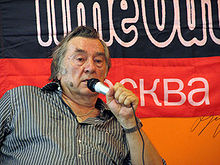Alexander Andreyevich Prokhanov
Alexander Andrejewitsch Prokhanov ( Russian Алекса́ндр Андре́евич Проха́нов ; born February 26, 1938 in Tbilisi , Georgian SSR , Soviet Union ) is a Russian writer , journalist . He describes himself as a socialist patriot and, with his combination of left and nationalist ideas, is one of the country's most controversial writers.
Life
Prokhanov initially worked for several years as Pravda’s foreign correspondent in Afghanistan , Nicaragua and Nagorno Karabakh until 1970 . He was the first to report in 1969 on the incident on the Ussuri , the height of the Sino-Soviet border conflict . Since 1971 he has published more than 40 books in the Soviet Union and Russia, including a number of nationally known novels and political non-fiction books. From 1989 to 1991 he was (the last) editor-in-chief of the magazine Soviet literature .
In 1990 he founded the opposition magazine Djen (Tag) and took over the position of editor-in-chief. During the August coup , Prokhanov sided with the putschists. Due to a ban by the Justice Department, the magazine was renamed Sawtra (Tomorrow) in 1993 . It still appears under this title today.
His political thriller Mr. Hexogen (Russian: Господин Гексоген, Gospodin Gexogen), published in 2002, was a national bestseller in Russia in 2004. As part of a fictional narrative, he constructed an involvement of the Russian secret service in the real Moscow bomb attacks on residential buildings and thus triggered a fierce nationwide discussion. Chechen terrorists were officially accused of perpetrating the attack. However, no evidence has been presented to date.
Politically, he has been a colorful and controversial figure for years. He was both an advisor to the presidential candidate of the Communist Party Gennady Andreevich Zyuganov and in the crossfire of criticism for right-wing extremist statements. In the summer of 2000, Prochanov invited the Holocaust denier and Ku Klux Klan boss David Duke to Moscow.
With his very strong and colorful language, he always offends various opponents. He described social democracy as an “old age disease”, “a political prostate disease ”. In January 2008 he published a collection of socially critical and political essays in German for the first time. Since Putin's second term, Prokhanov has moved closer to the line of the Kremlin. He described himself as an imperialist and declared in 2014 that he was a supporter of the Cold War . At the center of his criticism, however, are the elite raids and the lack of social responsibility.
In 2013 he called Mikhail Gorbachev the "synonym of evil." He was responsible for "the failure of a great civilization".
In December 2014, Prokhanov appeared on Iranian television claiming that Israel and the US would support the Islamic State terrorist organization in order to reduce Russia's influence in the Middle East and the North Caucasus. In September 2015, in an interview with the Russian TV broadcaster Rossija 24, he claimed that the USA had deliberately created conflicts in North Africa and the Middle East in order to trigger a wave of refugees and use it as a "demographic bomb" against Europe.
Prokhanov is the founder and chairman of a nationalist think tank called the Izborsk Club .
Works (selection)
- 2002: Mr. Hexogen , bestseller in Russia 2004
- 2008: Beyond Russian villa fences . German: ISBN 9783837010541
Web links
- Literature by and about Alexander Andrejewitsch Prochanow in the catalog of the German National Library
- Book excerpt in German
- Sawtra magazine (Russian)
Individual evidence
- ↑ a b http://www.nzz.ch/2004/09/15/fe/article9USSM.html ( page no longer available , search in web archives ) Info: The link was automatically marked as defective. Please check the link according to the instructions and then remove this notice.
- ↑ Christoph Laug: Documentation: Prominent representatives of right-wing thinking in Russia , Federal Center for Political Education. August 3, 2013. Retrieved October 9, 2014.
- ↑ Jean Cremet: Crossover in Moscow. In: Jungle World. September 9, 1998, archived from the original on July 1, 2007 ; Retrieved May 25, 2015 .
- ↑ This is how several observers of Russian politics call him an anti-Semite, see article by Kai Ehlers ( Memento of the original from December 23, 2014 in the Internet Archive ) Info: The archive link was automatically inserted and not yet checked. Please check the original and archive link according to the instructions and then remove this notice.
- ^ Anti-Semitic book angers Russians , BBC News. December 17, 2000. Retrieved October 9, 2014.
- ↑ Nikolai Jolkin: 80 Years Without Lenin: The Future of the Communist Party of Russia. In: The Voice of Russia. January 23, 2004, archived from the original on October 24, 2007 ; Retrieved May 25, 2015 .
- ↑ http://www.russland-buecher.ru/
- ↑ a b Roland Götz: Analysis: The Isborsker Klub - Russia's anti-western ideologues , Federal Center for Political Education. March 17, 2015. Accessed July 30, 2015.
- ↑ Jens Berger: Separatists in Eastern Ukraine - The Spirits We Called , July 24, 2014
- ^ Foes of America in Russia Crave Rupture in Ties , New York Times, March 15, 2014
- ↑ http://www.suchbuch.de/leseproben/politik_gesellschaft/jenseits_russischer_villenzaeune/977
- ↑ Gorbachev: Icon of Revolution or Symbol of Decline? , RBTH, March 2, 2016
- ^ Mossad training ISIL terrorists: Putin aide , PressTV. December 7, 2014. Accessed July 31, 2015.
- ↑ Russian writer and political activist: Mossad training ISIS terrorists in Iraq, Syria , Jerusalem Post. December 8, 2014. Accessed July 31, 2015.
- ^ The end of Europe from a Russian perspective , Zeit Online. September 11, 2014. Retrieved September 11, 2015.
- ↑ Демографическое оружие. Реплика Александра Проханова , vesti.ru. September 4, 2014. Retrieved September 11, 2015.
| personal data | |
|---|---|
| SURNAME | Prokhanov, Alexander Andreevich |
| ALTERNATIVE NAMES | Проха́нов, Алекса́ндр Андре́евич (Russian) |
| BRIEF DESCRIPTION | Russian writer and journalist |
| DATE OF BIRTH | February 26, 1938 |
| PLACE OF BIRTH | Tbilisi |
